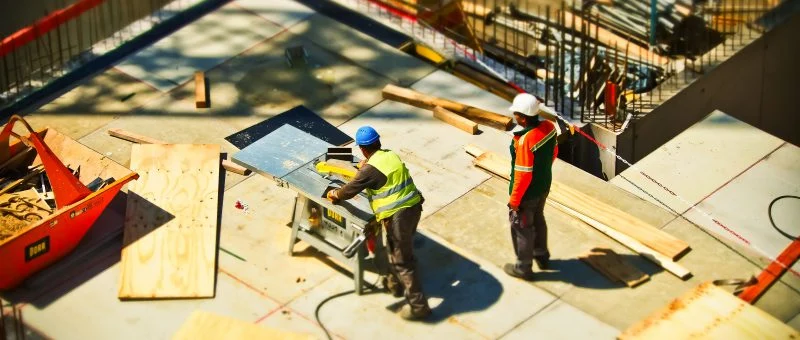As with any business, ‘cashflow is king’ in the construction industry.
Even profitable construction companies can have cashflow problems, and there has been a high rate of insolvencies in the industry for years. Contractors go out of business not because they run out of work, but because of poor management and lack of financial control.
If you consistently make a loss, you’ll fail. If you run out of cash, you’ll fail.
Construction companies need special cashflow management strategies to help them fund expenses, mitigate any losses, and achieve profitability.
Here are some of the challenges that are unique to this sector:
Time-lag between income and expenses
Construction companies have to cover their expenses every week, even though the average number of days it takes to get paid is 60 – 90.
Change orders
Change orders are common, due to extreme weather causing delays, or a project requiring more time, money and/or resources than originally expected. Try to resolve change orders quickly so the project can be completed and the final bill issued.
Retention
Construction contracts often have a retention rate up to 10%, meaning that only 90% of completed work can be billed. Try to negotiate a reduction in the retention rate, perhaps dropping to 5% retention once 50% of the work is complete. If possible, withhold payment to your sub-contractors at the same rate (assuming that is permitted under local regulations).
Inventory
Don’t buy too many materials and store them for future use. If not used quickly, this inventory just ties up your cash. Don’t allow resources to build up beyond what you need in the short- to medium-term, and sell off any excess.
Equipment
Similarly, if you have invested in equipment that’s not in use, it’s losing money. Know how much each item costs to run, and monitor your equipment usage accurately. Limit downtime. If equipment is not generating money for the business, then rent it or sell it. Consider leasing fixed assets rather than purchasing them.
Cash management throughout the lifecycle of a construction project
Every project is different, and you need to know the net cash position for each unique project. Here are some tips that cover the five main stages of a construction contract:
- Pre-bidding and bidding
- Review the credit status of your potential customer
- Review the payment arrangements in the project contract
- Cost the contract accurately
- Understand what financial records need to be kept
- Contract awarded
- Finalise the details of the project contract and negotiate favourable terms
- When payments will be made
- How payments will be made
- What happens if payments are not made
- What costs are allowed within the contract
- What performance penalty is allowed, if any
- What is the retention rate
- When is the property owner’s monthly cut-off for invoices to be received
- Before construction
- Hold a pre-construction meeting to agree the project overview and what reporting and documentation is required
- Establish a performance and billing schedule, month by month
- During construction
- Follow the performance and billing schedule
- Follow the schedule of values
- Negotiate with vendors and subcontractors to save money
- Send invoices in line with the contract terms
- Pay suppliers in line with the contract terms
- End of contract
- To avoid delaying the final payment, ensure you complete the project to the customer’s satisfaction
- Collect the final payment
If that’s what to focus on for each construction project, here is some general cashflow management advice:
At company level
- Use cashflow management software to predict future income and expenses
- Train your project managers so they understand how to manage cashflow
- Develop a good relationship with your bank, so you can access credit if you need it to cover unexpected expenses
Dealing with suppliers
- Let suppliers know you are shopping around – this incentivises them to offer you the best deal
- Negotiate a discount on materials
- Extend credit from 30 to 60 days
- Use financing to spread the cost
Paying staff
- Offer incentives based on cashflow performance
- Consider outsourcing. Full-time construction employees are usually paid weekly or fortnightly, while sub-contractors are usually paid every month (this can benefit cashflow but potentially raises the risk of issues with security or quality)
Invoicing customers
- Write clear payment terms
- Check credit reports before you make any deals
- Develop a front-loaded schedule of values. Bill in phases for items such as mobilisation, then site development, and finally walls, roof, landscaping and finish. Don’t put all the profit into the last tasks. Build profit into the front end to help mitigate the natural cash outflow when the job gets underway
- Automate your invoices so they are issued on time – or even early
- Offer payment incentives
- Avoid over-billing and under-billing. Over-billing may increase cashflow in the short term, but too much overbilling may mean that you are borrowing from one job to pay for another. It’s best to invoice according to how much of the project is completed
- Accept electronic payments; they are the quickest way to get paid
- Do whatever you can to increase the speed of receivables, such as reducing your payment terms to 50 days or less
- Chase late payers promptly, and restructure terms
Automation
There are various ways to make it easier to manage your construction company, such as job management software from Okappy, and cash management services from AkoniHub.
With money in the bank, you can pay bills promptly, which helps get competitive prices from suppliers and sub-contractors. With better cashflow, you have more capital to use for day-to-day operations, accounts payable and growth. With increased automation, you can stay on top of your cashflow and have more chance of building a successful construction business.
Akoni helps businesses make the most of their cash. Register for free at AkoniHub.com






